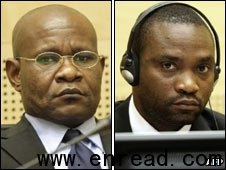| ||||||||||||||||||||||||||||||||||||||||||||||||||||||||||||||||||||||||||||||||||||||||||||||||||||||||||||||||||||||||||||||||
|
two 1 congolese 2 leaders have denied war crimes at the start of their trial at the international criminal court in the hague. 两名被指称的刚果国民军首领在海牙国际刑事法庭审判开始的时候就否认了战争罪行。  mathieu ngudjolo chui (l) and germain katanga were "top commanders" germain katanga and mathieu ngudjolo chui are accused of directing an attack on the village of bogoro in 2003 in which more than 200 people were killed. they face charges of ordering attacks on 3, sexual slavery, 4, and 5 child soldiers. both deny the allegations and have expressed sympathy for the victims. 'defending his people' chief 6 luis moreno-ocampo opened the case against them saying they had tried to wipe out(消灭) the village of bogoro. "some [villagers] were shot dead in their sleep, some cut up by machetes to save bullets," he said. "others were burned alive after their houses were set on fire by the attackers." he described the two 7 as "the top commanders of the troops that killed, 8 and pillaged(掠夺,抢劫)". "they used children as soldiers, they killed more than 200 civilians in a few hours, they raped women; girls and the elderly, they looted the entire village and they transformed women into sex slaves," he said. the two men listened to all the charges against them and pleaded not guilty to each one. mr katanga's lawyer claimed that his client was "merely defending his own people" and played no part in the bogoro attack. mr ngudjolo's counsel also said his client had not been involved at bogoro and that he had a "clear conscience". continuing unrest it is only the second trial at the icc in the hague. the first case - of congolese militia leader thomas lubanga - began in 2008 but has been delayed by legal argument. mr lubanga's union of congolese 9 (upc) militia(义勇军,自卫队) had controlled bogoro until the other 10 attacked. mr katanga and mr ngudjolo are accused of leading 11 lendu and ngiti fighters against the upc. 12 says their goal was to "13" the village, mainly populated by ethnic hema, in the mineral-rich ituri province of the democratic republic of congo. prosecutors plan to call 26 witnesses, although 21 of them will testify hidden from public view for fear of reprisals(报复性没收,拘押). the trial is expected to take several months. the conflict in ituri was part of a war that raged in dr congo following the 1994 genocide in neighbouring rwanda and involved troops and fighters from several neighbouring countries. militia leaders from all sides have been accused of using the conflict to profit from the region's mineral reserves, especially gold. campaign group human rights watch has called on the icc to also investigate officials from dr congo, rwanda and uganda, accusing them of arming rival militias in ituri. the ituri conflict ended after the 14 of european union peacekeepers. the wider dr congo conflict officially ended in 2003 but much of the east 15 16. 点击  收听单词发音 收听单词发音
|
||||||||||||||||||||||||||||||||||||||||||||||||||||||||||||||||||||||||||||||||||||||||||||||||||||||||||||||||||||||||||||||||
上一篇: 下一篇: |
||||||||||||||||||||||||||||||||||||||||||||||||||||||||||||||||||||||||||||||||||||||||||||||||||||||||||||||||||||||||||||||||
- 发表评论
-
- 最新评论

